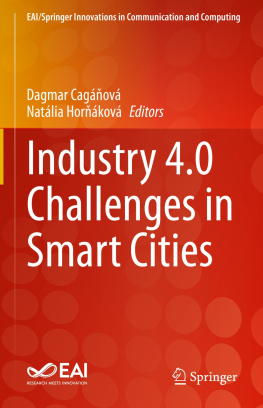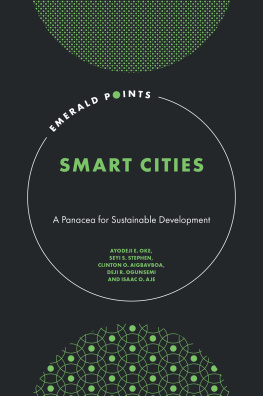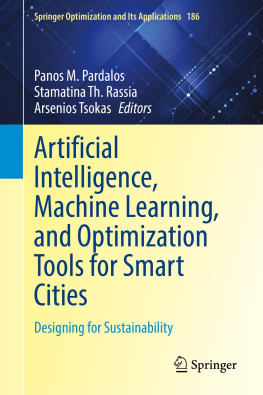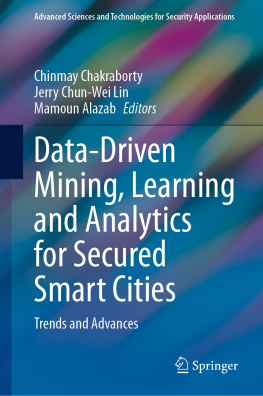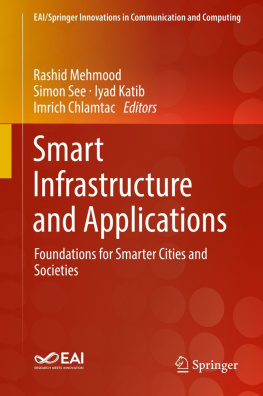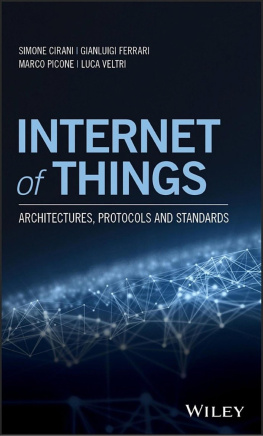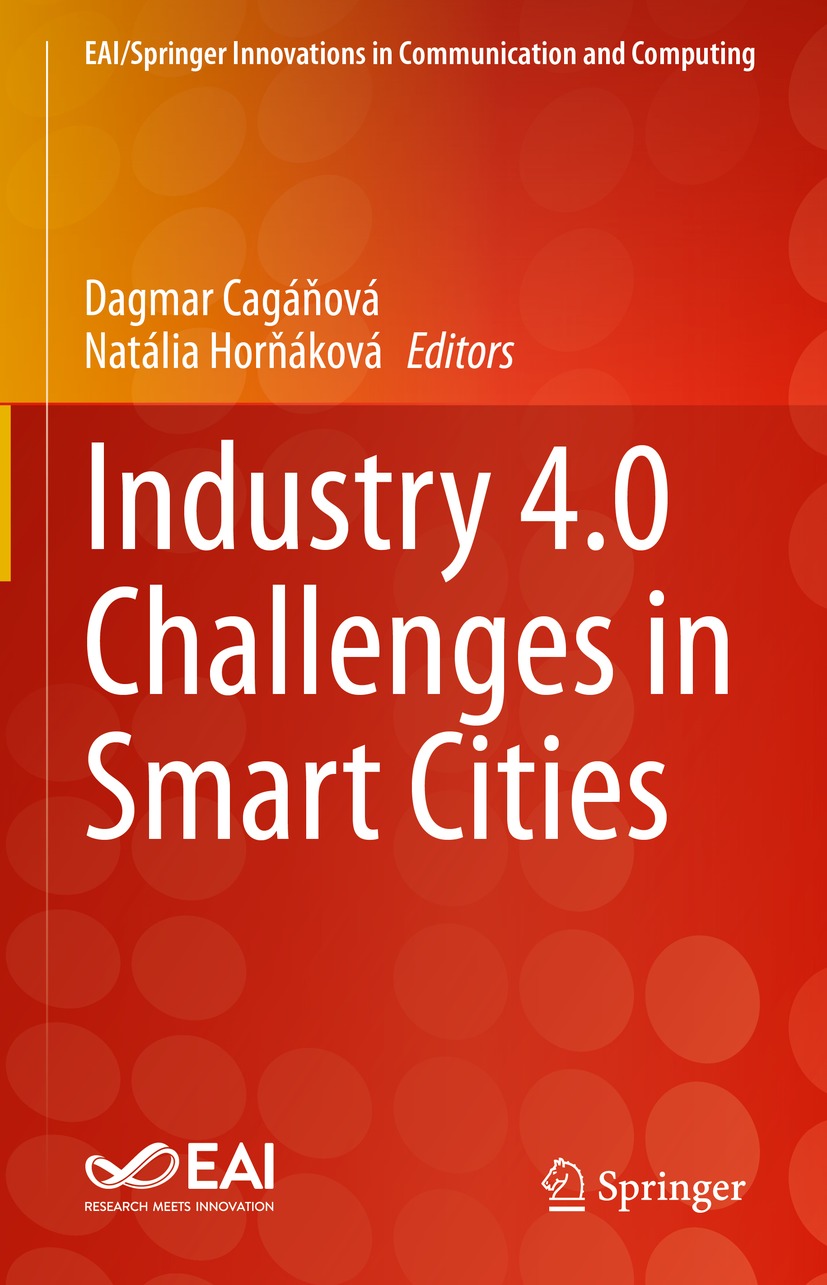EAI/Springer Innovations in Communication and Computing
Series Editor
Imrich Chlamtac
European Alliance for Innovation, Ghent, Belgium
The impact of information technologies is creating a new world not yet fully understood. The extent and speed of economic, lifestyle and social changes already perceived in everyday life is hard to estimate without understanding the technological driving forces behind it. This series presents contributed volumes featuring the latest research and development in various information engineering technologies that play a key role in this process. The range of topics, focusing primarily on communications and computing engineering include, but are not limited to, wireless networks; mobile communication; design and learning; gaming; interaction; e-health and pervasive healthcare; energy management; smart grids; internet of things; cognitive radio networks; computation; cloud computing; ubiquitous connectivity, and in mode general smart living, smart cities, Internet of Things and more. The series publishes a combination of expanded papers selected from hosted and sponsored European Alliance for Innovation (EAI) conferences that present cutting edge global research as well as provide new perspectives on traditional related engineering fields. This content, complemented with open calls for contribution of book titles and individual chapters, together maintain Springers and EAIs high standards of academic excellence. The audience for the books consists of researchers, industry professionals, advanced level students as well as practitioners in related fields of activity include information and communication specialists, security experts, economists, urban planners, doctors, and in general representatives in all those walks of life affected ad contributing to the information revolution.
Indexing: This series is indexed in Scopus, Ei Compendex, and zbMATH.
About EAI - EAI is a grassroots member organization initiated through cooperation between businesses, public, private and government organizations to address the global challenges of Europes future competitiveness and link the European Research community with its counterparts around the globe. EAI reaches out to hundreds of thousands of individual subscribers on all continents and collaborates with an institutional member base including Fortune 500 companies, government organizations, and educational institutions, provide a free research and innovation platform. Through its open free membership model EAI promotes a new research and innovation culture based on collaboration, connectivity and recognition of excellence by community.
Editors
Dagmar Cagov and Natlia Horkov
Industry 4.0 Challenges in Smart Cities

Logo of the publisher
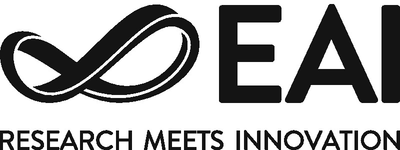
Logo of the publisher
Editors
Dagmar Cagov
Slovak University of Technology in Bratislava, Trnava, Slovakia
Natlia Horkov
Slovak University of Technology in Bratislava, Trnava, Slovakia
ISSN 2522-8595 e-ISSN 2522-8609
EAI/Springer Innovations in Communication and Computing
ISBN 978-3-030-92967-1 e-ISBN 978-3-030-92968-8
https://doi.org/10.1007/978-3-030-92968-8
The Editor(s) (if applicable) and The Author(s), under exclusive license to Springer Nature Switzerland AG 2023
This work is subject to copyright. All rights are solely and exclusively licensed by the Publisher, whether the whole or part of the material is concerned, specifically the rights of translation, reprinting, reuse of illustrations, recitation, broadcasting, reproduction on microfilms or in any other physical way, and transmission or information storage and retrieval, electronic adaptation, computer software, or by similar or dissimilar methodology now known or hereafter developed.
The use of general descriptive names, registered names, trademarks, service marks, etc. in this publication does not imply, even in the absence of a specific statement, that such names are exempt from the relevant protective laws and regulations and therefore free for general use.
The publisher, the authors, and the editors are safe to assume that the advice and information in this book are believed to be true and accurate at the date of publication. Neither the publisher nor the authors or the editors give a warranty, expressed or implied, with respect to the material contained herein or for any errors or omissions that may have been made. The publisher remains neutral with regard to jurisdictional claims in published maps and institutional affiliations.
This Springer imprint is published by the registered company Springer Nature Switzerland AG
The registered company address is: Gewerbestrasse 11, 6330 Cham, Switzerland
Preface
This book deals with the next level of innovative technologies influencing industry and connectivity sectors in the future industrial, urban, and sustainable development. It provides a platform for synergy of ideas within smart industrial innovations, approaching them from various points of view: industry and management 4.0, expansion of new business models, smart technologies identifying up-to-date global challenges, new trends and opportunities. New managerial ideas, cutting-edge innovations, and technologies for mobility agenda are highlighted together with a multidisciplinary perspective approach. This unique point of view will inspire researchers, graduate students, and those who are interested in Smart City topics. Readers will find the answers for various questions connected to global and interconnected modern society.
The book comprises the following 12 chapters:
Chapter investigates the ways to safe implementation and authentication for IoT devices, tying together all associated algorithms, protocols, and network systems. A number of techniques to address related challenges are proposed, such as elliptic curve cryptography (ECC), quantum cryptography, public keys, private keys, pseudonymous certificates, and more. Moreover, a simulation has been carried out to show the efficiency and security of a specific protocol, which proved to be powerful against de-synchronization, replay, and session hijacking attacks.
Chapter is oriented towards determining the best logistical route for the trade of goods between China and Ukraine as a mathematical model. Four different options and their related infrastructure were consideredrailway, maritime, road, and air transportin an experiment. For each option, order delivery volumes of the corresponding type of goods, cargo transportation volume in the current batch, and risk assessment factors using corresponding kinds of transport were evaluated to obtain the final profits of enterprises.
Chapter regards the SIM evolution, the main variances of M2M eSIM networks and approaches to their commercialization. Basic information about architecture, interfaces, and operations is mentioned, as well as three types of M2M eSIM networksOperator-controlled variance, OEM-controlled variance, and M2M service provider-controlled variance. Before choosing the commercialization approach, leading ecosystem players are to consider available resources, limitations, advantages, and disadvantages of each option. M2M eSIM technology adoption is still posed with the challenge of complex mesh networks and a long list of standardized and non-standardized interfaces, also acting as an opportunity for future research.

